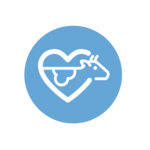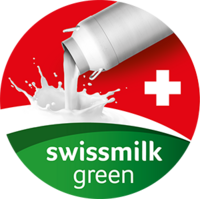With its sufficient rainfall and ample pasture, Switzerland is ideally suited to milk production. However, milk production is also a considerable source of various greenhouse gases. For this reason it makes sense for milk processors like HOCHDORF to make a contribution towards reducing the pressure that milk production exerts on the environment.
Situation in 2021:
- HOCHDORF is an active and long-term participant in the ongoing development of the Swiss "swissmilk green" industry standard. HOCHDORF is an advocate of Switzerland's pasture areas and therefore supports pasture-based milk production
- HOCHDORF processes Swiss cows’ milk, which is produced in accordance with the "swissmilk green" industry standard
- Milk from the HOCHDORF direct supplier (Thur Milch Ring AG) already fulfils over 97% of "swissmilk green" requirements
- HOCHDORF, along with Thur Milch Ring AG, is an important and reliable partner for regional milk producers. HOCHDORF is well aware of the regional and social responsibility of this role
Goals for 2030:
- 100% of HOCHDORF direct suppliers meet the "swissmilk green" Swiss industry standard
- Additional sustainability requirements are also being developed with the HOCHDORF direct suppliers to supplement the "swissmilkgreen" industry standard
- All milk from direct suppliers iscollected in a CO2-neutral way and delivered to HOCHDORF
- We seek cooperation with our milk producer organisations around various sustainability topics
Sustainable Swiss milk – "swissmilk green"
The production standard for sustainable Swiss milk was introduced in 2019. The guidelines of this production standard implement the high standards of the entire Swiss dairy industry in terms of animal welfare, feeding, sustainability and social issues. In addition to ten basic requirements, milk producers have to meet two additional requirements
The "swissmilk green" brand recognises milk products that meet the production standard requirements (www.swissmilk.ch/green).
Sustainable Swiss milk – "swissmilk green"
The 10 basic requirements:
- Cows roam freely
- Each cow has a name
- Young calves gain strength at home for more than three weeks
- Milking twice a day
- Strict rules for livestock shows
- No pregnant cows to be slaughtered
- Medication is administered with care
- Biodiversity is promoted
- GMO-free feeding
- No palm oil, no palm fat
Examples of additional requirements:
- Both BTS (particularly animal-friendly housing) and RAUS (regular outdoor exercise of cows) are fulfilled
- Treatment of the animals with complementary medicine methods
- Social security for all family members working on the farm
- Training of apprentices
- Annual further training
- Public relations on the farm



